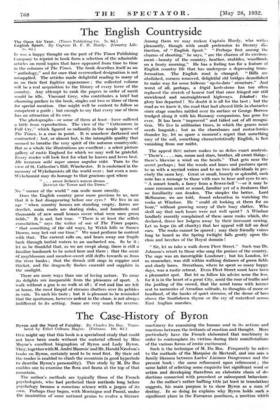The Case-Hist ory of Byron
Byron and the Need of Fatality. By Charles Du Boa Trans- lated 'by Ethel Colburn Mayne. (Putnam. 10s. Bd.) ONE might say that this book is a specialized study that could not have been made without the material offered by Miss Mayne's excellent biographies of Byron and Lady Byron. They, together with M. Andre Maurois' and Mr. Harold Nicolson's hooks on Byron, certainly need to be read first. By their aid the reader is enabled to climb the mountain (a good hyperbole to describe Byron's personality). This study by M. Du Bos enables one to examine the flora and fauna at the top of that mountain.
The author's methods are typically those of the French psychologists, who had perfected their methods long before psychology became a conscious science with a jargon of its own. Perhaps they began, with Montaigne and Pascal, under the inspiration of some national genius to evolve a liteiarY
machinery for examining the human soul in its actions and reactions between the irritants of emotion and thought. More particularly have the French elaborated that machinery in order to contemplate its victims during their manifestations of the various forms of -erotic excitement.
Such is the technique of M. Du Bos. Frequently he refers to the methods of the MarqUise de Merteuil, and one sees a family likeness between Laclos' Liaisons Dangereitses and the present book : the same refinement upon refinement ; the same habit of selecting some exquisite but significant Word or action and developing therefrom an elaborate chain of de- ductions connected with precedent or subsequent behaviour.
As the author's rather baffling title (at least in translation) suggests, his main purpose is to show Byron as a man of destiny. In so doing he explains why Byron holds such a significant place in the European pantheon, a position which.
we English to this day cannot understand. With our unique views of morality, shy and confused, we have written off Byron as personally a cad, and worse ; and have taken pains to discOver in his poetry symptoms of vulgarity and bonn- derism. Both Goethe and Napoleon betray the same symp- toms, but this has not smirched their fame in their own countries. Nor has it prevented Europe from estimating Byron 8t his true magnitude, as a being of such demoniac vitality that he was born to be a master, a leader. Mr. Desmond MacCarthy, a shrewd critic of men in their relations with other men, suspects that Byron was lost between two potentialities that would never fructify : that he was neither pure poet (in the sense that Milton and Keats were) nor com- plete man of action (in the sense that Julius Caesar was). It is difficult not to agree ; butat the back of one's mind lurks a feeling that the criticism should be directed at Byron's circum- stances rather than his character. His thwarted pride made him impatient ; and impatience can obscure the real per- sonality. Only a great poet could write with the directness, with the ability to wield so gracefully a set stanza-form, which we find in Don Juan. Only a great man of action could step into the chaos of moral corruption and intrigue in the Balkans during 1824, and by his aloofness and simplicity catalyse the confusion into a united purpose that was to result in the triumph of Greece.
But the doubt still lingers. The present book resolves itself into an exhaustive inquiry into the qualities in Byron's per- sonality which give rise to that doubt. We see him beset by a singular fantasy about the fate overhanging the Byron family ; a sense of doom that isolated it, and each member of it, front the rest of humanity. He really was a modern Orestes, pursued by the Furies crying retribution upon his Atridean House. Obsessed by this mania, he felt himself bound by a
perverse loyalty, exaggerated by the idea of foredoomed disaster, and no matter how much he hated individual mem- bers—for example, his mother—he delighted in identifying himself with anybody of the blood. A dangerous mania, especially for this genius so easily stimulated by classical precedents running counter to the smugly accepted moral system of his own country and his own time. The part played by his sister Augusta in the tragic sequel is cleverly explored by AL- Du Bos, who indeed is indefatigable in his analysis of the characters of all the women concerned in the complicated and long-drawn tragedy.
That tragedy lasted for the whole of Byron's life, and women were concerned in it from first to last. It began with his struggles against his mother, and it ended with the heart- breaking parting from the Countess Guiccioli on his departure for Greece. But between lay the incidents of Caroline Lamb, Lady Oxford, his sister Augusta, and most tragic of all, his wife Annabelle.
In the study of this relationship between Byron and his wife M. Du Bos is at his best, for the complicated character of Annabella gives hint an opportunity to employ to the utmost his technical machinery. He is not satisfied to con- demn her as a self-righteous and intolerable prig, as Byron did. He examines her letters, comma by comma, breaking down their façade of moralistic formality and, discovering behind it the inexperienced girl possessed of a solid and sane conscience, a self-controlled but deeply passionate nature ; and he leads one to the conclusion that had she not been per- manently maimed in spirit by her contact with Byron's mania, she would have become a wonderful woman, combining beauty, charm, character and a remarkable intellect.
RICHARD cHURCII.









































 Previous page
Previous page